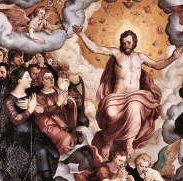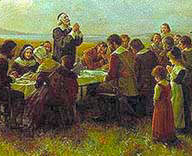 |
| A familiar fresco - I would like to identify it. |
November, 2013 - Overview for the Month
The month of November is dedicated to the Souls in Purgatory, whose feast is celebrated on November 2. November falls during the liturgical season known as Ordinary Time and is represented by the liturgical color green.
General: That priests who experience difficulties may find comfort in their suffering, support in their doubts, and confirmation in their fidelity.
Missionary: That as fruit of the continental mission, Latin American Churches may send missionaries to other Churches. (See also www.apostleshipofprayer.net)
The feasts on the General Roman Calendar celebrated during the month of November are:
1. All Saints, Solemnity
2. All Souls, Feast
3. Thirty-First Sunday in Ordinary Time, Sunday
4. Charles Borromeo, Memorial
9. Lateran Basilica, Feast
10. Thirty-Second Sunday in Ordinary Time, Sunday
11. Martin of Tours; Veterans Day (USA), Memorial
12. Josaphat, Memorial
13. Frances Xavier Cabrini, Memorial
15. Albert the Great, Opt. Mem.
16. Margaret of Scotland; Gertrude, Opt. Mem.
17. Thirty-Third Sunday in Ordinary Time, Sunday
18. Churches of Peter and Paul; Rose Philippine Duchesne (USA), Opt. Mem.
21. Presentation of Mary, Memorial
22. Cecilia, Memorial
23. Clement I; Columban; Bl. Miguel Agustín Pro (USA), Opt. Mem.
24. Christ the King, Solemnity
30. Andrew, Feast
The Gospel readings for the Sundays in November 2013, are taken from St. Luke and are from Year C, Cycle 1.
November 3rd - 31st Sunday in Ordinary Time
|
The Gospel relates the story of Jesus meeting with Zacchaeus.
|
November 10th - 32nd Sunday in Ordinary Time
|
Jesus says that "God is not God of the dead, but of the living, for to him all are alive."
|
November 17th - 33rd Sunday in Ordinary Time
|
In this Gospel Jesus talks about the end of the world.
|
November 24th - Solemnity of Christ the King
|
The Gospel recounts the story of the good thief.
|
 During November, as in all of Ordinary Time (Time After Pentecost), the Liturgy signifies and expresses the regenerated life from the coming of the Holy Spirit, which is to be spent on the model of Christ's Life and under the direction of His Spirit. As we come to the end of the Church year we are asked to consider the end times, our own as well as the world's. The culmination of the liturgical year is the Feast of Christ the King. "This feast asserts the supreme authority of Christ over human beings and their institutions.... Beyond it we see Advent dawning with its perspecitive of the Lord's coming in glory."— The Liturgy and Time, A.G. Mortimort
During November, as in all of Ordinary Time (Time After Pentecost), the Liturgy signifies and expresses the regenerated life from the coming of the Holy Spirit, which is to be spent on the model of Christ's Life and under the direction of His Spirit. As we come to the end of the Church year we are asked to consider the end times, our own as well as the world's. The culmination of the liturgical year is the Feast of Christ the King. "This feast asserts the supreme authority of Christ over human beings and their institutions.... Beyond it we see Advent dawning with its perspecitive of the Lord's coming in glory."— The Liturgy and Time, A.G. Mortimort
This month the main feasts are the Solemnity of All Saints (November 1), All Souls (November 2),St. Charles Borromeo, (November 4), Lateran Basilica (November 9), St. Martin of Tours,(November 11), St. Josaphat (November 12), St. Frances Xavier Cabrini (November 13), St. Albert the Great (November 15), Sts. Margaret of Scotland and Gertrude (November 16),Presentation of Mary (November 21), St. Cecilia (November 22), Sts. Clement I and St. Columban (November 23), the Solemnity of Christ the King (November 24), St. Catherine of Alexandria (November 25), and St. Andrew (November 30).
The feasts of St. Martin de Porres (November 3), St. Leo the Great (November 10), and St. Elizabeth of Hungary (November 17) are superseded by the Sunday Liturgy. The feast of St. Andrew Dung-Lac and Companions (November 24) is superseded by the Solemnity of Christ the King.
 The national holiday (USA) of Thanksgiving also falls on the last Thursday of November. There is a special liturgy which may be used on this day. (Read more here.)
The national holiday (USA) of Thanksgiving also falls on the last Thursday of November. There is a special liturgy which may be used on this day. (Read more here.)
The tradition of eating goose as part of the Martin's Day celebration was kept in Holland even after the Reformation. It was there that the Pilgrims who sailed to the New World in 1620 became familiar with this ancient harvest festival. When, after one year in America, they decided to celebrate a three days' thanksgiving in the autumn of 1621, they went in search of geese for their feast. We know that they also had deer (a present from the Indians), lobsters, oysters, and fish. But Edward Winslow, in his account of the feast, only mentions that "Governor Bradford sent four men on fowling that so we might after a more special manner rejoice together, after we had gathered the fruit of our labours." They actually did find some wild geese, and a number of wild turkeys and ducks as well.
.....
Exerpted from the Handbook of Christian Feasts and Customs, Francis X. Weiser















